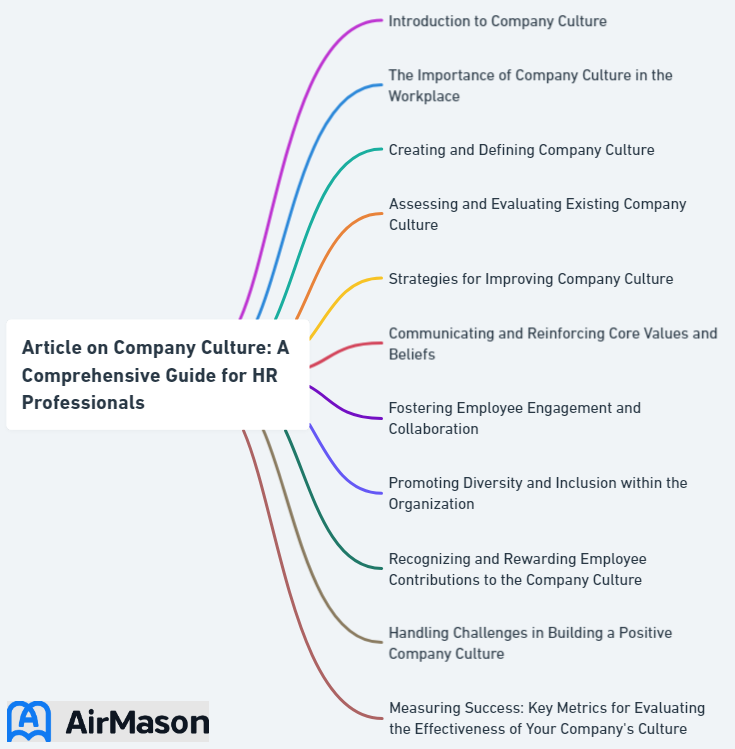
In today’s rapidly evolving business landscape, company culture has emerged as a critical factor in driving organizational success. But what exactly is company culture, and why has it become so crucial? In this comprehensive article on company culture, we delve into the world of company culture and explore its impact on employee satisfaction, productivity, and talent attraction. Get ready to embark on a journey that will illuminate the secrets behind building a strong, vibrant, and resilient company culture that fosters growth and innovation.
Key Takeaways
- Understanding and defining company culture is essential for creating a successful workplace.
- Core values, employee retention & satisfaction, productivity/performance, and talent attraction are key components of strong company culture.
- Strategies such as aligning values & practices with core beliefs, promoting diversity & inclusion initiatives, and encouraging work-life balance can help create an inspiring environment that drives success.
Understanding Company Culture
Company culture is the lifeblood of an organization, encompassing its values, attitudes, and practices, which form the workplace culture. It’s the intangible glue that binds employees together and influences how they interact, collaborate, and make decisions. A strong culture fosters employee engagement, promotes loyalty, and ultimately drives business performance. But what does it take to create a great company culture, and how can organizations improve their existing culture to stay ahead in the competitive market?
Firstly, gaining a comprehensive understanding of company culture and the role of core values in its formation is necessary.

Defining Company Culture
Company culture refers to the collective values, attitudes, and practices that define an organization’s internal and external operations, contributing to a healthy culture. It is the unique “personality” of an organization that influences how employees feel, interact, and perform. This is why establishing a well-defined company’s culture is so important, as it streamlines our efforts and presents a unified, inspiring vision to all members of the organization.
Nonetheless, the approach to build a strong culture is not uniform and varies from one organization to another. Each organization’s culture is distinct, and what may work for one company may not necessarily work for another. Therefore, when defining the desired company culture, it is essential to consider the unique values, goals, and needs of the organization and its employees.
Understanding an Organization’s Culture
An organization’s culture is a dynamic and multifaceted aspect that plays a pivotal role in shaping its identity and operations. It encompasses the shared values, beliefs, norms, and behaviors that define the way a company operates and how its members interact with one another and the outside world. This culture can be explicit or implicit, but it always influences decision-making, problem-solving, and daily interactions. It often begins with the leadership team, as their values and attitudes set the tone for the entire organization. Understanding an organization’s culture is crucial because it affects employee engagement, productivity, and the overall success and sustainability of the company. By examining an organization’s culture, one gains valuable insights into its unique identity and can foster a more harmonious and effective work environment.
The Role of Core Values
Core values are the fundamental beliefs and principles that guide an organization. They serve as the foundation for company culture, directing the behaviors and expectations within the organization. Examples of core values may include:
- Honesty
- Trust
- Accountability
- Respect
- Excellence
These values provide guidance for decision-making and behavior within the company.
For a positive work atmosphere and to encourage collaboration, it’s vital to harmonize company values and practices with individual and organizational objectives. When core values are effectively communicated and consistently adhered to, it fosters a sense of unity and identity among the staff, ultimately contributing to a strong and vibrant company culture.
The Importance of Strong Company Culture

A strong company culture is not only essential for employee satisfaction but also plays a significant role in overall business success. Research has shown that companies with strong cultures enjoy higher employee retention, increased productivity, and are more likely to attract top talent. But what makes a strong company culture, and how can organizations cultivate such an environment?
We’ll probe into the advantages of a robust company culture, focusing on its effects on employee retention, satisfaction, productivity, performance, and talent attraction.
Employee Retention and Satisfaction
Employee retention and satisfaction are directly impacted by a company’s culture, with employees more likely to stay in a positive work environment. In fact, research suggests that nearly two-thirds of employees cite corporate culture as a major reason for staying with their current employer or seeking a new job. Compensation is just as essential as culture in retaining employees, particularly among younger workers.
Moreover, when more workers discuss the perks offered by their company, there is a significant increase in the company’s culture rating. This highlights the importance of not only cultivating a strong culture but also ensuring that employees are aware of the benefits and opportunities available to them, making company culture important.
Enhanced Productivity and Performance
A strong company culture can lead to increased productivity and performance by promoting positive emotions and well-being, motivating and engaging employees, enhancing customer experience, facilitating collaboration, and influencing an individual’s mindset. In fact, a positive company culture has been found to increase employee engagement, resulting in 17% higher productivity and 41% lower absenteeism.
Moreover, a supportive and optimistic culture, wherein leaders demonstrate appreciation and involve employees in decision-making, can contribute to higher employee retention rates and diminished turnover. This, in turn, leads to a more stable and thriving organization.
Attracting Top Talent
A favorable company culture provides employers with a noteworthy advantage in the recruitment and retention of top talent. Individuals of high caliber are drawn to organizations with cultures that align with their values and goals. In today’s competitive job market, a strong company culture can be a powerful differentiator that sets your organization apart from the rest.
Creating an inviting work environment that is attractive to job seekers, as well as maintaining current employees by providing them with a sense of purpose and belonging, is vital for attracting and retaining top-notch talent. Implementing initiatives that align with company values, promoting diversity and inclusion, and encouraging work-life balance can all contribute to a more appealing company culture.
Key Elements of a Successful Company Culture

While every organization’s culture is unique, successful company cultures often share key elements that contribute to a thriving work environment. These elements include effective leadership, open communication, and employee development opportunities. By understanding the importance of these elements, organizations can take proactive steps to create a positive and dynamic company culture.
We’ll delve into these key elements, elaborating on their role in constructing a successful company culture.
Effective Leadership
Effective leadership is crucial in shaping and maintaining a strong company culture, as leaders set the tone and model desired behaviors within the organization. Leaders who support their employees are the most important factor in determining a company’s culture score. By exhibiting desired behaviors, exhibiting respect for others, and fostering an atmosphere of trust and collaboration, leaders can drive a positive company culture and inspire employees to follow suit.
To impact company culture positively, leaders can:
- Initiate the process of culture-shaping
- Ensure the company’s values are clearly articulated
- Model a positive attitude
- Actively listen to employees
- Take action on their feedback
By prioritizing and reinforcing a positive culture, leaders can create an environment in which employees feel valued, engaged, and motivated to succeed.
Open Communication
Open communication is essential in fostering a positive company culture, as it:
- Encourages transparency, trust, and collaboration among staff
- Facilitates the exchange of information, ideas, and feedback
- Results in more effective decision-making, problem-solving, and innovation
- Promotes a positive work culture, employee engagement, and a sense of belonging
- Ultimately enhances overall productivity and performance.
By encouraging employees to voice their opinions, providing timely feedback, and creating an environment where employees feel at ease expressing their ideas, organizations can foster open communication and facilitate authentic workplace relationships. This, in turn, contributes to a more positive and inclusive work environment that supports the growth and success of the company.
Employee Development and Growth Opportunities
Providing opportunities for employee development and growth is essential for maintaining a strong company culture and retaining top talent. Employee development serves as an incentive for employees to exceed expectations, demonstrating that the company values their progression and development. This can contribute to increased job satisfaction, productivity, and performance.
To support employee development and growth, organizations can offer mentorship programs, provide tuition reimbursement, and construct career development plans. By investing in employee development, companies can not only enhance their company culture but also ensure a competitive edge in the ever-evolving business landscape.
Culture Training in the Workplace
Culture training in the workplace plays a pivotal role in fostering a harmonious and productive environment. It encompasses a structured approach aimed at familiarizing employees with the values, norms, and practices that define an organization’s unique culture. This training equips individuals with the necessary skills and knowledge to integrate seamlessly into the work culture, aligning their behavior and attitudes with the company’s overarching goals. Through workshops, seminars, and interactive sessions, employees gain insights into the company’s mission, vision, and core values, which in turn, enhances their sense of belonging and commitment. Moreover, culture training in the workplace serves as a foundation for effective communication and teamwork, as it encourages open dialogue and mutual respect among colleagues, regardless of their roles or backgrounds. Ultimately, investing in culture training not only cultivates a more inclusive work environment but also contributes to higher employee satisfaction and retention rates.
Assessing Your Organization’s Culture

Assessing your organization’s culture is a critical process that involves gathering employee feedback and analyzing turnover rates, as well as job satisfaction. By understanding the current state of your company culture, you can identify areas for improvement and implement strategies to build a more positive and dynamic work environment. This, in turn, can contribute to increased employee satisfaction, productivity, and overall business success.
We’ll discuss various methods to evaluate your organization’s culture, thereby gaining insights into its strengths and potential areas for improvement.
Employee Surveys and Feedback
Employee surveys and feedback provide valuable insights into the current state of your company culture and areas for improvement. By conducting regular surveys that address areas such as:
- job satisfaction
- work-life balance
- communication
- team collaboration
Organizations can gather important information about employee experiences and the overall health of their strong organizational culture.
To ensure successful assessment of company culture, it is important to:
- Clearly define the objectives of the survey
- Ensure that the questions are actionable
- Share survey results with the team
- Take action on key findings
- Regularly conduct employee surveys to track changes in company culture over time
- Make necessary adjustments to maintain a positive work environment.
Analyzing Turnover Rates and Job Satisfaction
Analyzing turnover rates and job satisfaction can help identify potential issues within your organization’s culture. High turnover rates may point to underlying issues that need to be addressed, such as inadequate management, lack of employee engagement, or a hostile work environment. By carefully analyzing turnover rates, organizations can identify patterns, comprehend the reasons for employee departures, and take proactive steps to enhance company culture and retain top talent.
Key indicators of job satisfaction when evaluating company culture include:
- Employee net promoter score (eNPS)
- Employee satisfaction index (ESI)
- Turnover rate
- Online company ratings
- Employee surveys
- Participation in company activities
- Feedback and performance reviews
- Long-term employee retention
By monitoring these indicators, organizations can gain a comprehensive understanding of their company culture and make data-driven decisions to improve employee satisfaction.
Strategies for Improving Company Culture

Once you have assessed your organization’s culture, it’s time to implement strategies to improve company culture. These strategies include aligning company values and practices, promoting diversity and inclusion, and encouraging work-life balance. By focusing on these areas, organizations can create a positive and dynamic company culture that fosters employee satisfaction, productivity, and overall business success.
We’ll delve into these strategies, elaborating on how they can fortify your company’s culture.
Aligning Company Values and Practices
Ensuring that company values and practices are aligned helps create a cohesive and positive work environment. By integrating core beliefs and ethical standards into day-to-day operations and decision-making processes, organizations can ensure that their actions and behaviors are consistent with their stated values and principles.
To align company values and practices, organizations can:
- Lead by example
- Uphold and promote core values
- Connect values to daily work
- Provide training and orientation
- Recognize and reward value-centric behavior
By maintaining a strong alignment between values and practices, organizations can foster a positive and authentic healthy company culture that supports employee engagement and success.
Promoting Diversity and Inclusion
Promoting diversity and inclusion within your organization contributes to a more innovative and dynamic company culture. A diverse workforce brings together individuals with unique perspectives, experiences, and ideas, which can lead to increased creativity, innovation, and adaptability in the face of change.
To foster a culture of diversity and inclusion, organizations can set goals to increase diversity hiring, retention rates, and the percentage of the workforce that feels a sense of belonging on their team. Implementing diversity and inclusion initiatives, such as offering unconscious bias training, creating employee resource groups, and ensuring equitable hiring practices, can help create a more inclusive work environment that values and respects the unique contributions of each individual.
Encouraging Work-Life Balance

Encouraging work-life balance is essential for supporting employee well-being and satisfaction, which in turn contributes to a stronger company culture. A healthy work-life balance enables employees to effectively manage their personal and professional responsibilities, reducing stress and burnout.
To support work-life balance, organizations can offer flexible work schedules, telecommuting options, and paid time off. Additionally, providing resources such as on-site childcare, wellness programs, and mental health support can assist employees in achieving a balanced lifestyle. By prioritizing work-life balance, companies can create a more positive and resilient workforce that is better equipped to tackle the challenges of the modern business landscape.
Building an Organizational Culture
Building an organizational culture is a critical aspect of fostering a healthy and productive work environment. It encompasses the values, beliefs, and behaviors that shape how individuals interact within a company. A strong organizational culture not only defines the collective identity of the workforce but also influences decision-making, communication, and overall performance. Leaders play a pivotal role in cultivating this culture by exemplifying the desired traits and reinforcing them through policies and practices. Additionally, open communication channels, regular feedback mechanisms, and inclusive initiatives are instrumental in maintaining a thriving organizational culture. When done effectively, the process of building an organizational culture leads to increased employee satisfaction, higher retention rates, and ultimately, a more successful and resilient organization.
Inspiring Examples of Exceptional Company Cultures
Sometimes, the best way to learn is by example. Companies like Google, Apple, and Zappos are renowned for their good company culture, which prioritize employee satisfaction and engagement, and have been successful in recruiting and maintaining talented personnel. These organizations have established cultures that foster innovation, collaboration, and a strong sense of belonging, setting the bar high for other companies looking to improve their own culture.
By examining the practices and values of these exemplary companies, organizations can identify best practices and strategies to implement in their own culture-building efforts. Learning from the successes of these industry leaders can provide valuable insights and inspiration for organizations seeking to create a strong and vibrant company culture.
Overcoming Challenges in Building a Strong Company Culture

Building a strong company culture is no easy task, and organizations may face various challenges in their pursuit of a positive work environment. Common challenges include:
- Misalignment among the leadership team
- Reluctance to adapt
- Inadequate communication
- Rigid organizational structures
- Insufficient commitment and reinforcement
To overcome these challenges, organizations must be committed to open communication, ongoing evaluation, and continuous improvement efforts. By addressing these challenges head-on and implementing strategies such as aligning company values and practices, promoting diversity and inclusion, and encouraging work-life balance, organizations can cultivate a strong company culture that fosters employee satisfaction, productivity, and overall success.
Summary
In conclusion, company culture is an essential aspect of an organization’s success, impacting employee satisfaction, productivity, and talent attraction. By understanding the importance of company culture, its key elements, and effective strategies for improvement, organizations can create a positive and dynamic work environment that fosters growth and innovation. By learning from the examples of exceptional company cultures and overcoming challenges in building a strong culture, organizations can unlock their full potential and thrive in today’s competitive business landscape.
Frequently Asked Questions
How do you explain company culture?
Company culture is the shared values, attitudes, behaviors, standards and beliefs that define an organization’s day-to-day operations and atmosphere. It reflects both the written and unwritten rules of an organization and is the sum of what people think, say and do as they work together. Company culture impacts how decisions are made, the vibe in the workplace, and the experience employees and customers have.
What is company culture and why is it important?
Company culture is the shared values, beliefs, and behaviors that make up the work environment. It encourages employees to collaborate, act in accordance with the company’s values, and contributes to a better customer experience. Culture is essential for creating a positive work atmosphere and creating an environment of success.
What is important in a company culture?
A strong company culture is key to employee engagement, fostering teamwork and inclusivity, leading to up to 72% higher engagement than those without. Happy employees are also more likely to work harder, creating an overall successful workplace.
What are the key elements of a successful company culture?
Effective leadership, open communication, and employee development are key elements of a successful company culture.
How can organizations assess their current company culture?
Organizations can assess their current company culture by surveying employees, tracking turnover rates and measuring job satisfaction.